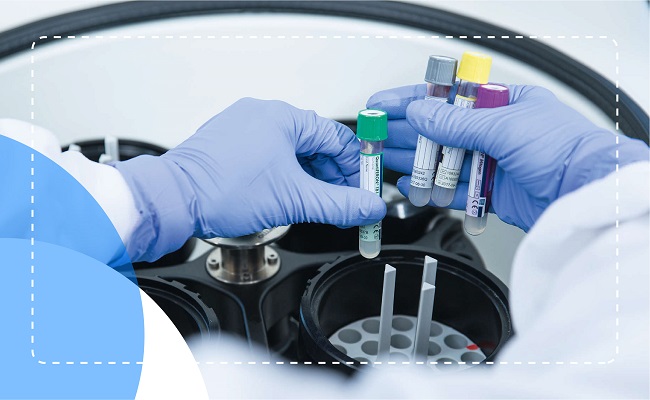Mumps is a disease that cannot be subjective because it spreads quickly and can cause complications if not treated early, especially affecting male fertility.
Therefore, testing for mumps is extremely important, in order to diagnose whether a person has been infected or is infected with the virus that causes mumps. From there, help doctors monitor progress and give treatment in case of need.
- What You Should Know About Mumps
Before we learn what tests are included in the mumps test, let’s take a look at the mumps facts to understand the health importance of mumps testing.
Mumps is also known as eczema. This is an infectious disease caused by a viral agent that causes the salivary glands to swell, causing pain. Usually, the time from when a person is infected with this virus and the onset of the disease will last between 12-24 days.

How is mumps primarily transmitted? Mumps is transmitted from an infected person to a healthy person through the respiratory route. When the virus is present in the droplets of saliva or nasal secretions that are splashed outside when the patient sneezes, coughs, spits, talks, so on. accidentally, a healthy person inhales directly or touches the items contaminated with this respiratory fluid will have risk of infection.
People with mumps are very contagious from about 2 days before symptoms appear until 6 days after these symptoms stop.
Mumps is a common illness in young children, causing typical symptoms such as a high fever above 39 degrees Celsius, then swelling of the salivary glands in the next few days. Not only that, but the child’s cheek area is also swollen, causing pain when speaking, chewing food, especially acidic water.
Symptoms of mumps to watch out for are:
- Pain in one or both cheeks.
- Pain when chewing, swallowing food.
- Headache, fever.
- Swelling of the jaw or parotid gland, pharyngitis.
- Scrotal swelling and testicular pain.
Why does mumps cause infertility? When mumps is not diagnosed and treated in time, it will cause extremely dangerous complications, especially increasing the risk of infertility.
Specifically, the disease not only causes inflammation of the sweat glands, but also affects and inflammations in other parts such as the brain and reproductive organs such as with encephalitis, meningitis, pancreatitis, orchitis in Male fertility affects fertility.
What is the difference between salivary gland inflammation and mumps? Although both diseases share similar salivary gland manifestations, they differ in their causes and consequences.
Inflammation of the salivary glands will cause the parotid to swell and spread to the area around the gland. At the same time, the skin in the gland will be red, painful, and have inflammatory nodes that respond to the position of the jaw angle or behind the ear on the same side.
When pressing on the parotid gland, there is a soft feeling, causing pain that can cause pus to drain at the mouth of the Stenon tube. When eating, talking will feel pain and cause the patient to have a fever of 38-39 degrees.
In addition, for parotid gland inflammation caused by stones is usually only one side, or recurrent. Before a delicious meal, or seeing sour food, it is easy for patients to increase saliva production in the oral cavity.
However, when there are abnormal signs, it is not advisable to self-diagnose at home, the patient needs to see a specialist to be examined and tested to most accurately diagnose the disease condition, avoiding the consequences. serious illness caused by delayed treatment.
- What is the Diagnostic Test for Mumps?
What is the mumps test? The mumps test includes small tests that help doctors determine the genetic strain of the virus, and can determine the patient’s immunity to the mumps virus through specific antibodies.
To be more specific, the goal of the mumps test is to:
- Helps diagnose a patient with previous mumps infection.
- Diagnose whether the patient is infected with the virus that causes mumps.
- Determine the body’s immunity by looking for the presence of antibodies to the mumps virus.
- Monitoring disease progression, helping doctors come up with the most effective treatment regimen for mumps.
- When Should a Mumps Test be Conducted?
The mumps test is usually ordered by a doctor in the following cases:
- When the patient has signs and symptoms that are suspected to have mumps.
- Indicated to see if the patient’s body has an immune system to the mumps virus.
- A person who has been in contact with a patient confirmed to have mumps and is showing symptoms such as fever, jaw pain similar to mumps.
- Diagnostic Tests for Mumps
4.1 Antibody Test
The antibody test is one of the mumps tests that helps doctors confirm a patient’s immunity. From there, it is possible to diagnose mumps or monitor the patient’s condition according to the stage of treatment.
Mumps antibodies are specific proteins produced by the immune system that protect the body against the virus that causes mumps.
There are two types of antibodies produced including:
- IgM Antibodies
IgM antibodies are the first antibodies that appear in the blood when a person is exposed to the mumps virus or after being vaccinated. IgM antibodies will remain elevated for a few days until peak levels are reached, then gradually decrease over the following weeks.

In the case of people who have never been vaccinated but have IgM antibodies, it is very likely that this person has been infected with mumps. But if both IgM and IgG antibodies are present at the same time, the person has mumps.
- IgG Antibodies
IgG antibodies appear later than IgM but are very effective in protecting the body from infection.
If IgG antibodies are present, the person has been vaccinated and/or does not have the disease. This also means that the person is immune to the virus that causes mumps.
But measles mumps rubella antibody test results without the presence of IgM and IgG do not consider the patient to be immune to the virus. It may be because this person has never been exposed to viruses, because IgG may appear late or because this person’s body does not respond to normal antibodies.
4.2 Virus Cultures Or Virus Genetic Material Tests
Viral culture tests or tests of viral genetic material can be performed on a wide range of samples.
But there is a limitation that this method can only help doctors determine the disease condition but cannot confirm the immunity in the patient’s body.
4.3 Virus Genetic Material Test (RT-PCR)
Through testing the genetic material of the virus (RT-PCR) will help doctors determine the genetic strain of the virus.
Tests that can detect the virus directly, can sometimes also be done to find the cause of serious complications caused by mumps.
For patients with weakened immune systems, typical immune antibody responses may not be present. For this reason, testing for viral genetic material will be ordered by a physician to confirm the diagnosis of measles, especially when testing for antibodies is inconsistent with clinical findings.
4.4 Virus Culture Test
If a culture test for mumps or measles virus is positive, or a test for viral genetic material is positive, it means that the person is currently infected with the virus that causes the disease.

But if the results of the mumps virus culture test or the mumps virus genetic material test are negative, it means that this person is not infected. Symptoms suspected of being caused by mumps may be due to other causes.
4.5 Blood Test
Can a blood test tell if I have mumps? Peripheral total blood analysis, usually ordered in cases of suspected mumps virus infection.
Through the blood test results, if the white blood cell count is decreased, the neutrophil count also decreases, it may be caused by a viral cause and is usually increased to the normal level for a bacterial cause. In addition, urine and blood amylase tests showed increased results.
In addition, there are a number of other tests to diagnose mumps such as cerebrospinal fluid test, urinalysis, saliva test, erythrocyte agglutination inhibitor (HI) test, neutralization gangrene (NT), complement neck (CI).
Thus, testing for mumps is meaningful in timely detection of mumps and contributes to providing a method to better control symptoms caused by the disease, limit complications and avoid infecting people around.
In addition, to actively prevent the risk of mumps infection, it is extremely important to vaccinate against mumps at an early age and in case of emergency as prescribed by a doctor.
If you need more information related to mumps testing when you have doubts, you can call the hotline 19001717 Diag Laboratories in Ho Chi Minh City to get a medical expert. Answer questions and book an appointment easily.

 1900 1717
1900 1717 